#Global Interdependence
Explore tagged Tumblr posts
Text
youtube
"### Rethinking Our Place on Earth: Insights from the 2024 Planetary Summit As the world faces an unprecedented confluence of crises—climate change, pandemics, and geopolitical strife—Nils Gilman, a thought leader from the Berggruen Institute, opened the 2024 Planetary Summit with a compelling message that resonated deeply with the gathered audience. The summit, held in the newly inaugurated European headquarters at Venice’s Palazzo Diedo, brought together leading thinkers, scientists, and policymakers to embark on a vital dialogue about our collective future. Gilman emphasized that the challenges we face are not isolated incidents; rather, they are interconnected phenomena that necessitate a comprehensive reevaluation of our approach to governance, knowledge, and action. This brings us to the concept of “planetarity” — the fundamental understanding that we all coexist on one planet, interlinked in myriad ways. The summit served as a platform to discuss how this idea could reshape our understanding of global issues. Over the course of two days, participants engaged in profound discussions centered on establishing the “planetary” as a conceptual category. They explored the implications of embracing perspectives that transcend human-centric viewpoints and incorporate extra-human and extra-planetary considerations. Notably, the usage of technology was debated, as it plays a critical role in facilitating the emergence of planetary sapience—our collective intelligence as a global community. The limitations of existing governance structures were a recurring theme throughout the summit. As crises surpass national borders, the need for innovative frameworks for planetary coordination became increasingly evident. The participants confronted the notion of planetary pragmatism, questioning how institutions and epistemologies should evolve to meet challenges that incorporate not only human society but also the environment and other life forms. As we navigate the complexities of climate change, technological acceleration, and global interdependencies, the importance of rethinking our governance structures and philosophical outlooks cannot be overstated. The 2024 Planetary Summit represented a crucial moment in the intersection of science, philosophy, and politics. It underscored the urgency of developing new planetary institutions and ways of thinking, which are essential for shaping a sustainable and equitable future. In conclusion, the summit was more than a series of academic discussions; it was a clarion call for a paradigm shift in how we perceive, inhabit, and shape our planet. As we move forward, it is imperative that we embrace the concept of planetarity to foster connections that transcend geographical, political, and societal boundaries. To stay informed on this evolving discourse, we invite you to explore the work of the Berggruen Institute and engage with the growing community committed to these critical discussions. Learn More Here: [Berggruen Institute](https://ift.tt/D1KaMVl) Connect with Berggruen Institute: - Subscribe for our latest videos: @Berggrueninst - Stay Up to Date: [Berggruen Institute Updates](https://ift.tt/xFPJkMc) - Learn More about Studio B: [Studio B](https://ift.tt/pe38bBJ) Follow us on Social Media: - [Instagram](https://ift.tt/RjGnSBi) - [Twitter/X](https://twitter.com/berggruenInst) - [Facebook](https://ift.tt/Kybn5gf) - [LinkedIn](https://ift.tt/5Pm4Jd1)"
#planetary consciousness#global interdependence#crisis governance#rethinking institutions#extra-human perspectives#Youtube
0 notes
Text
What strategies could eliminate extreme poverty?
This post is a response to a question posed in its complete format: “What are the most promising innovations or strategies today that could sustainably eliminate extreme poverty within the next generation?” Thank you for the A2A, Faux-Bill. It is well beyond obvious that you are not the OG Bill Gates but a pretender. Whatever motivates you to disguise yourself as him and pose questions that he…

View On WordPress
0 notes
Text
The Curious Case of Universal Debt
The Curious Case of Universal Debt #artem
Content 16+ A peculiar phenomenon has emerged that would befuddle even the most pragmatic of accountants: everyone owes everyone. The United States, China, France, Germany, the United Kingdom—name a country, and chances are its national debt is not merely a small sum but a towering Everest of financial obligations. If everyone owes someone, who exactly is holding the IOUs? Let us journey into…
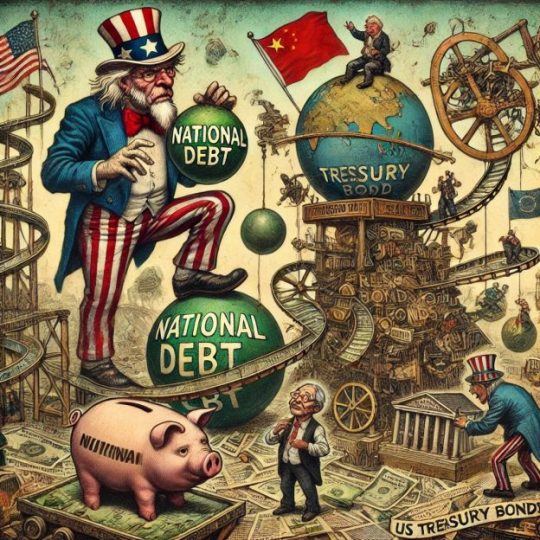
View On WordPress
#artem#borrowing dynamics#debt as wealth#debt cycles#debt sustainability#debt-driven growth#economic tightrope#economic trust#financial paradox#fiscal conundrum#global economy#global interdependence#international finance#IOUs#national debt#pension funds#sovereign bonds#universal debt#US-China debt
0 notes
Text
So I was watching the new Leftist Cooks video, and I started thinking
The way we tend to talk about improving American society in America often focuses on a model that takes direct inspiration from one source. One country or culture is doing (or has done) things “right” and *we* should do it that way.
But the reality is that part of imagining and building systems that have not existed before is taking inspiration from what has worked in past and present systems and cultures *worldwide* while leaving behind the parts that continue to reinforce harm, and melding them together to create something more than the sum of its parts.
And to me, yes that does include the parts of the US that are valuable because as uncomfortable as it is when looking at how awful this country has been and especially is now, there are genuinely good ideas in how this country was built and those ideas that do have value *should* be preserved, even as they must be revised to represent those that have not been able to have an equal voice in the direction of the country historically
#us politics#political action#politics#collective action#community#democracy#community organizing#community support#socialism#communism#anti capitalism#anarchism#hope#hopepunk#imagining something better#a better world is possible#a better tomorrow#peace#restorative justice#real justice#justice system#culture#global community#reform#social contract#interdependence#harm reduction#breaking the cycle#more than the sum of its parts#kindness
12 notes
·
View notes
Text
Today's globalized world has brought all of us closer together, yet it has not made us any more fraternal. Indeed, we are suffering from a famine of fraternity, which arises from the many situations of injustice, poverty, and inequality and also from the lack of a culture of solidarity. […] Yet the worst effect of this famine of fraternity is armed conflict and war, that makes enemies not only of individuals but entire peoples, and whose negative consequences reverberate for generations. [...] Building peace is a craft that requires passion and patience, experience and farsightedness, tenacity and dedication, dialogue and diplomacy. And listening as well: listening to the cries of those who are suffering because of wars, especially children. Their tear-stained eyes judge us: the future we prepare for them will be the court of our present choices. There is still time to write a new chapter of peace in history: we can do so in such a way that war would belong to the past, not to the future. […] I want to emphasize a word that I like to repeat, for I consider it decisive: fraternity. Fraternity cannot remain an abstract idea, but must become a real point of departure: indeed, it is an essential dimension of man, who is a relational being. A lively awareness of this relationality leads us to see and treat each person as a true sister and brother; without it, it becomes impossible to build a just society, a solid and lasting peace.
Pope Francis, in his June 2023 Address to the Security Council of the United Nations. Italics original, bolded emphases added.
#Catholicism#Christianity#My Pope#peace#justice#attentiveness#communication#patience#war#love#charity#interdependence#globalization
0 notes
Text

Wait until those geniuses learn about the interdependent nature of the global supply chain built over the last several generations.
Without the Chinese market, there is no avenue for this country to have sizeable revenue growth. And without revenue growth, this country’s economy contracts.
So, no growth.
And no trust in our government, given that losses in both stocks AND bonds show [global] money flight out of the U.S.
Trump is literally bankrupting the country. Everything else they claim is total bullshit.
1K notes
·
View notes
Text
What’s more, if people insist on pure untouched wilderness as the only kind of natural habitat there is, we will struggle to see humanity itself as belonging, as part of nature and the ecosystem.
And if we cannot see a future of coexistence and interdependence between all beings, we will only distance ourselves from the rest of the world, and lose touch with that which we hold dear and wish to preserve.
What strikes me as incredibly delusional is that the mindset of “humanity is purely destruction” has become so ingrained in us, that this endless dismay has become accepted as an unequivocal truth even among academics, whom we source our information from.
Apparently we humans are the bane of the earth, the greatest force of death and destruction there is (as if the earth has not destroyed itself countless times long before we emerged). We put ourselves on an endless guilt train as the ultimate oppressors and dominators of the earth.
Yet at the same time we see ourselves as powerless, unworthy to even exist in the same space as other living things. We inherited a fate we would never have chosen, and collectively believe that the best thing for us would be to disappear.
Academics and laypeople alike are wont to say, in an almost nonchalant manner, “Oh yes, humans will probably die out as a species, then the earth will recover and be just fine.”
There is some dangerously disjointed thinking here. We can’t be both the magnanimous force of transformation and worthless little humans who are irrelevant to the future. We can neither believe in nor fight for the future of life on this planet while insisting we do not deserve one.
"There's no wildlife here. The land is barren and stripped from farming chemicals"
I just saw two blue herons fly super low over our house, which means they've been fishing in the creek behind us, which means there's fish there. Which means there's bugs to feed the fish and algae to feed the bugs, which means the water and soil is worth something damnit.
Yes, I'm sorry the suburb isn't the grand, sweeping swath of uninhabited land that you so desperately crave but would learn to loathe, but saying that the land here is barren and that there's no wildlife here and that there's nothing to salvage- that's a You problem. Nature might be struggling, but against all odds it is at least trying.
#bioregional animism#animism#nature#druidry#climate change#interdependence#i studied biology at university and see this kind of mindset all the time#i refuse to buy into such disparagement of our entire species for it is never that simple#i also think there's a correlation between undermining the value of human life and the increase in war and genocide around the world#but that is also because global exchange leads to greater events of any kind
17K notes
·
View notes
Text
Dinkscrump Linkdump

I'm about to leave for a 20+ city book tour for my new novel PICKS AND SHOVELS. Catch me on Feb 14 in BOSTON for FREE at BOSKONE , and on Feb 15 for a virtual event with YANIS VAROUFAKIS. More tour dates here.

Well, Saturday's come around and I have a gigantic list of links that didn't fit into this week's newsletter, so it's time for another linkdump, 26th in the series:
https://pluralistic.net/tag/linkdump/
My posting is about to get a lot more erratic, as I'm days away from leaving on a 20+ city book-tour, which starts in Boston on Feb 14, with a sold-out event at the Brookline Booksmith:
https://brooklinebooksmith.com/event/2025-02-14/sold-out-cory-doctorow-ken-liu-picks-and-shovels
But Bostonians get another bite at the apple: I'm appearing at Boskone, the city's venerable sf convention, a few hours before my Brookline gig, and admission is free:
https://schedule.boskone.org/62/
The rest of the tour (including a virtual event with Yanis Varoufakis on the 15th) is here, and more dates (New Zealand, possibly Pittsburgh and Atlanta) are being added all the time:
https://craphound.com/novels/redteamblues/2025/02/06/announcing-the-picks-and-shovels-book-tour/
Of course, even as I scramble to get ready to hit the road for months, I'm regrettably forced to give some rent-free space in my head to Elon Fucking Musk. This week, I wrote about DOGE as a government-scale private-equity style plundering of the nation:
https://pluralistic.net/2025/02/07/broccoli-hair-brownshirts/#shameless
But that was before I read Henry Farrell and Abraham Newman's Lawfare article about how Musk's seizure of payment chokepoints will allow him (and Trump) to surveil the entire economy and wield unilateral, unaccountable power:
https://www.lawfaremedia.org/article/elon-musk-weaponizes-the-government
In 2023, Farrell and Newman published an important book called Underground Empire, explaining how, during the War on Terror, GWB (and then Obama) weaponized global payment processing systems (most notably SWIFT) and other boring, technical systems, and then used them to wield enormous power around the world:
https://pluralistic.net/2023/10/10/weaponized-interdependence/#the-other-swifties
Farrell and Newman's point isn't merely that this power was used unwisely or cruelly, but also that the co-opted systems had an actual, useful, important job to do – a job that was only possible if these systems were widely viewed as credibly neutral and apolitical. The book ends with a sobering message about the chaos on the horizon if (when) other countries walk away from these system, leaving infrastructure vacuums in their wake. In their new Lawfare piece, Farrell and Newman imply not just that Musk and Trump are fashioning a powerful weapon out of the nation's digital infrastructure, but also that this could permanently undermine the vital national systems they're seizing control over, with no obvious candidates to replace them.
Meanwhile, the Democrats are still trying to find their asses with both hands, even as voters across the nation bombard them with demands to actually do something. I'm gonna call my senators and rep right after I finish this and remind them that when South Korea's autocratic president attempted a coup, lawmakers stormed the capital, leaping the fences while livestreaming to voters:
https://www.axios.com/2025/02/06/democrats-congress-trump-musk-doge-calls
But not everyone is taking Musk's bullshit lying down. The AFL-CIO has led a coalition of unions in suing DOGE:
https://gizmodo.com/americas-unions-sue-doge-launch-the-department-of-people-who-work-for-a-living-2000559998
And they've launched a counterinitiative with the delightful name of "The Department of People Who Work for a Living":
https://deptofpeoplewhowork.org/
It's nice to see some inside/outside strategy underway. After all, Musk is cruel and disgusting, but he – and the lawyers and creeps who back him – are also very, very stupid, and they're fucking up all over the place.
Take shutting down the Consumer Financial Protection Bureau, the agency charged with defending America from financial predators (e.g. would-be usurers hoping to turn their social media sites into payment processing platforms). Under Biden's CFPB chief Rohit Chopra, the Bureau was an absolute powerhouse, adopting rules, investigating scammers, and punishing wrongdoers, all in service to the American people:
https://pluralistic.net/2024/07/26/taanstafl/#stay-hungry
So naturally Musk and Trump have shut down the Bureau. But, as Adam Levitin writes for Credit Slips, this was a profoundly stupid move. You see, under Dodd-Frank – the post-2008 financial crisis law that created the CFPB – state attorneys general are empowered to enforce its rules. Those rules can't be amended or rescinded for so long as the CFPB is in a coma. What's more, any "violation of an enumerated consumer law is a violation of the Consumer Financial Protection Act," which can be gone after by state AGs. Another thing: the Truth in Lending Act has a threshold for small loans, below which the Act doesn't apply. The CFPB is supposed to adjust that threshold for inflation, but without a CFPB, that threshold will be frozen in amber like the federal minimum wage, bringing every-larger constellations of financial activity within scope for AG enforcement in any or every state in the Union. Also: none of this can be changed without a 60-vote Senate majority. Nice one, Elon:
https://www.creditslips.org/creditslips/2025/02/shutting-down-cfpb-is-not-like-shutting-down-usaid.html
That isn't the only way that Trump shot himself in the dick last week. As Luke Savage writes, threatening to put tariffs on Canadian goods (and to annex Canada and make it the 51st state) had a profound effect on Canadian politics:
https://www.lukewsavage.com/p/all-bets-are-off
Before last week, Justin Trudeau's political legacy seemed assured. His many leadership failures, along with a billionaire-funded dark-money hate-machine that targeted him with culture-war nonsense and climate denial all added up to record low approval ratings. It was so bad that Trudeau actually sent Parliament home (recklessly leaving Canada without a legislature on the eve of Trump's presidency) and resigned as Liberal Party leader.
A week ago, pretty much everyone in Canada figured that the Conservative leader Pierre Poilievre was about to romp to victory with a Ba'ath-style Parliamentary majority. Poilievre was and is an extraordinarily weak candidate, a guy who has literally never had a job except for "politician," who nevertheless ran as a political outsider, leading a coalition of racists, climate exterminationists, xenophobes, forced-birth militants, and other cryptofascists and low-tax brain-worm victims. The threat of a Poilievre government with a commanding majority was frankly terrifying. Think of him as someone with Trump's agenda and Mitch McConnell's ruthless administrative competence. Trump is bad enough – but smart Trump? Nightmare.
Then came the Trump tariffs and the annexation threats, and overnight, the Tories' 20-point lead narrowed to a two-point lead, which continues to shrink. Poilievre's brand boils down to "Make Canada America Again" – dismantle medicare, smash unions, punish immigrants, ban abortion. With Canadians booing the American anthem at NFL and NBA games and Quebecois demonstrators waving maple-leaf flags, this is not a good time to be running as the America guy.
Don't get me wrong. Trudeau is terrible. Bill Clinton terrible, say. But Poilievre? A fucking monster. Canada's political future may just have been rescued by Trump's big, stupid mouth. Thanks, eh?
Meanwhile, south of the border, our American cousins keep getting fed into the corporate woodchipper. It's been just over a year since Mainers went to the polls and voted in a Right to Repair law with an 83% majority. But a year later, the law is foundering, amid a corporate legal blitz led by the automakers, who have also put Massachusetts' massive popular 2020 Right to Repair law on ice with endless lawfare. :
https://www.techdirt.com/2025/02/07/automakers-sue-to-kill-maines-hugely-popular-right-to-repair-law/
This is the status quo in America. As a highly influential, widely cited 2014 peer-reviewed study found:
economic elites and organized groups representing business interests have substantial independent impacts on U.S. government policy, while average citizens and mass-based interest groups have little or no independent influence.
https://www.cambridge.org/core/journals/perspectives-on-politics/article/testing-theories-of-american-politics-elites-interest-groups-and-average-citizens/62327F513959D0A304D4893B382B992B
In other words, the only time the American people get what they demand is when giant corporations and oligarchs want it too. But when the plutes want something that the people despise, they almost always get their way.
Speaking of which, how's things going with Uber?
This week, Hubert Horan, the aviation industry analyst whose writings on Uber are the most important analysis of the company's business, investor scams, wage theft, and lobbying, published his long-awaited 34th research note on the company:
https://www.nakedcapitalism.com/2025/02/hubert-horan-can-uber-ever-deliver-part-thirty-four-tony-wests-calamitous-legacy-at-uber-and-with-the-kamala-harris-campaign.html
This edition is devoted to Tony West, Uber's Chief Legal Officer, and also brother-in-law to Kamala Harris, as well as manager of her disastrous failure of a 2024 election campaign. West may have run a Democratic presidential campaign, but he epitomizes the corporate corruption that gave rise to Trump. As Horan writes, West's first major accomplishment at Uber was to get the company exonerated for intimidating customers who were raped by Uber drivers. But his obituary will lead with the fact that he got Prop 22 passed in Calfornia, legalizing Uber's worker misclassification gambit, which allows the company to pay well below minimum wage and evade all workplace protection laws.
It was West who tapped Silicon Valley's tech oligarchs for large-dollar donations to the Harris campaign, which presumably played a substantial role in Harri's unwillingness to take a tough line on Big Tech while on the trail, creating the (correct) impression among voters that Harris would stand up for big business over their own interests.
It's an important read, and it's a reminder that the Democrats lost the last election every bit as much as Trump won it, and that their paralysis in the face of a national crisis is absolutely in character for the Democratic Party.
But on the other hand, the antitrust surge in the US, UK, EU, Canada, Australia, France, Germany, and China (!) over the past five years are all the more remarkable and heartening in light of the dismal and corrupt state of world governments. After all, there is no billionaire-backed dark money lobby whipping up support for smashing corporate power. The antitrust victories of the 2020s marked a turning point – the first time in my memory when extremely popular policies that the wealthy hated triumphed.
Decapitating the agencies that made those policies won't change the enormous political rage that led to the antitrust surge. If anything, it will only feed it. Enforcers like Rohit Chopra, Lina Khan and Jonathan Kanter did brilliant, important work – but they were only able to do it because of us. They're out of office, but we're still here. Don't ever forget that.
I certainly won't. This week, I turned in the edited manuscript for my next book, a nonfiction title called Enshittification: Why Everything Suddenly Got Worse and What To Do About It, which Farrar, Straus and Giroux will publish next October:
https://us.macmillan.com/books/9780374619329/enshittification/
The day I turned it in Ars Technica ran a huge package called "As Internet enshittification marches on, here are some of the worst offenders," reeling off the most disgusting high-tech ripoffs trying to worm their way into your home and wallet:
https://arstechnica.com/gadgets/2025/02/as-internet-enshittification-marches-on-here-are-some-of-the-worst-offenders/
This sparked an epic Reddit thread on r/NoStupidQuestions:
https://www.reddit.com/r/NoStupidQuestions/comments/1ij42yh/what_are_some_other_examples_of_enshittification/
I love to see how giving a name and a description to this phenomenon has captured and directed some of that rage. And for the record, it doesn't bother me at all that some of these people are using "enshittification" to mean "corporations fucking shit up" without regard to my formal definition of the process. As I wrote last October:
Many people apply the term "enshittification" very loosely indeed, to mean "something that is bad," without bothering to learn – or apply – the theoretical framework. This is good. This is what it means for a term to enter the lexicon: it takes on a life of its own. If 10,000,000 people use "enshittification" loosely and inspire 10% of their number to look up the longer, more theoretical work I've done on it, that is one million normies who have been sucked into a discourse that used to live exclusively in the world of the most wonkish and obscure practitioners. The only way to maintain a precise, theoretically grounded use of a term is to confine its usage to a small group of largely irrelevant insiders. Policing the use of "enshittification" is worse than a self-limiting move – it would be a self-inflicted wound.
And also: there's a lot of stuff that's just shitty right now, which is one of the reasons my word's putting up such great numbers. People are getting fed up with it, in ways large…and small. Take the post-pandemic trend of using your phone in speaker-mode in public places. I'm a prison abolitionist, but I'll make an exception for people who do this. Display 'em in stocks. Chain 'em up by their wrists. Or, you know, do what they do in France: fine them €150 for using a speakerphone on the train:
https://www.thelocal.fr/20250206/french-train-passenger-fined-e150-for-using-phone-on-speaker
Speaking of gruesome tortures, the essential Long Forgotten blog has posted its extensive, thoughtful review of the changes to Disneyland's Haunted Mansion. Very few people can write about built environment entertainment like Long Forgotten (the only other person who comes to mind is the excellent Foxx Nolte). Long Forgotten's verdict is "mostly good, but man, that new gift shop *suuuuucks:
https://longforgottenhauntedmansion.blogspot.com/2025/02/beyond-bride-other-changes-in-2025.html
OK, it's time for me to go and make my packing list for the tour. I'm going to leave you with a song. Last night, my pal Cynthia Hathaway turned me on to the Shotgun Jazz band, led by trumpeter/frontwoman Maria Dixon. If you like Louis Prima-style shout-singing, you'll love 'em – I bought everything they had on Bandcamp this morning:
https://www.shotgunjazzband.com/


If you'd like an essay-formatted version of this post to read or share, here's a link to it on pluralistic.net, my surveillance-free, ad-free, tracker-free blog:
https://pluralistic.net/2025/02/08/commixture/#petardhoists

Image: i ♥ happy!! (modified) https://commons.wikimedia.org/wiki/File:Messy_storage_room_with_boxes.jpg
CC BY 2.0 https://creativecommons.org/licenses/by/2.0/
#pluralistic#linkdump#linkdumps#enshittification#reddit#semantic drift#doge#department of people who work for a living#labor#unions#right to repair#maine#speakerphones#france#hubert horan#uber#tony west#kamala harris#dinos#henry farrell#abraham newman#underground empire#cfpb#petard#canada#elections#pierre polievre#tories#justin trudeau#luke savage
130 notes
·
View notes
Text
youtube
"### Embracing Complexity: The Future of Global Politics Beyond Cold War Logic Over the past two years, the paradigm through which the United States government perceives global politics has undergone a significant transformation. In a departure from the established narratives of the Cold War and the recent trajectory of globalization, a new vision of world politics is emerging—one that recognizes the intricate tapestry of interconnected challenges facing our planet. The optimism for globalization, often deemed a strategic bet, has begun to unravel, revealing a world far more interconnected than previously imagined. While globalization has facilitated unprecedented connectivity, it has also given rise to complex issues that transcend national boundaries: climate change, economic inequality, food security, supply chain vulnerabilities, democratic decline, and mass migration are all symptomatic of an interdependent global system where no single entity exercises control. These challenges highlight a critical reality: the choices made by individuals and governments across the globe now carry repercussions that ripple far and wide, often in unpredictable ways. As we navigate this intricate web, the question looms—might the only way forward involve an acceptance of these complexities? The United States is currently facing the daunting challenge of shifting from simplistic, deterministic visions of the future to a more nuanced and realistic understanding of our planet's trajectory. Embracing this entangled reality requires not only imagination but also a willingness to engage collaboratively with diverse perspectives. On September 26, 2023, the Long Now Foundation hosted a pivotal seminar featuring Henry Farrell, Professor at the Johns Hopkins School of Advanced International Studies and a distinguished fellow at the Center for Advanced Study in the Behavioral Sciences (CASBS) at Stanford University. This seminar, titled "The Complex Aftermath of Globalization," highlighted the urgent need for a reimagined approach to global politics. DELIVERING A RANGE OF INSIGHTS grounded in his extensive research on democracy, technology, and global economics, Farrell urged participants to consider the multifaceted nature of contemporary challenges and to strategize accordingly. CASBS has long been a beacon for interdisciplinary collaboration, bringing together thought leaders from varying disciplines to confront pressing global issues. Their commitment to fostering discussions that span academia, policy, industry, civil society, and government creates fertile ground for innovative ideas that transcend traditional boundaries. As we move forward, the collective responsibility of designing a better future requires engaging with this complexity, rather than shying away from it. The time has come for policymakers and citizens alike to cultivate a mindset that not only accepts but thrives within complexity. We must recognize that the simplistic binaries of the past—friend or foe, nationalist or globalist—no longer suffice in an age where interconnected threats demand collective action and shared understandings. As the Long Now Foundation advocates for long-term thinking and responsibility, it is imperative that we collectively commit to understanding and addressing the nuanced challenges of our global environment. In fostering dialogue and collaboration across myriad fields, we can pave the way for innovative solutions that honor the intricacies of our world. Join the Long Now Foundation in this quest for deeper understanding and engagement. Subscribe to our podcasts, explore our seminar series, and become a member to support the ongoing work dedicated to architectural long-term thinking. As we look towards the uncertain future, may we take to heart the call for complexity, cooperation, and connectedness—an essential foundation for navigating the multifaceted world we inhabit."
#global interdependence#post-globalization challenges#democratic resilience#climate crisis politics#future of governance#Youtube
0 notes
Text
The Game of Common Interests: The Symbiotic Relationship of Terrorism and The Media
Mass media and terrorism have developed an interdependent relationship. The media is the terrorist’s breath of fresh air, and it is the lifeblood and sustenance of terrorism, where the media often capitalizes on the public's confusion, intrigue, and paranoia following terrorist attacks by producing sensationalized news that captures widespread attention. This dynamic, however, plays into the hands of terrorists, who exploit the extensive coverage to spread the agency of their extremist agendas and beliefs, particularly targeting and influencing vulnerable audiences, such as the youth. Professor Taha Najem of Naif Arab University had described this relationship as “symbiotic”.
In Najem's own words:
"As for the extremists, they precisely calculate the scope, location, and timing of their attacks to generate ample media attention,—or in other words, to generate advertisements for their messages on a global scale. The broader and more prolonged the media coverage of terrorism turns out to be, the greater the terrorists' feelings of accomplishment, influence, and power." (Najem, 2017).
Bruce Hoffman, the Director of the Center for Security Studies at Georgetown University said:
"Only by spreading the terror and outrage to a much larger audience can the terrorists gain the maximum leverage potential."
Najem argues that the relationship between the two can be understood through the media's tendency to capitalize on horrific tragedies. It often uses these as newsworthy scoops that not only provide information but also serve as marketing opportunities and profitable publicity. In some instances, the media may unintentionally promote terrorist operations by offering excessive coverage, which is driven by their own incessant need for fame, power, money, and influence. This aligns with the perpetrator's likeness, where some stage attacks often with the sole purpose of gaining publicity and creating propaganda rather than resolving political demands.
Researchers have established that media coverage is pivotal to the success of terrorist attacks, with the scope and intensity of coverage often being more important to terrorist groups than the quality of the reporting. However, this perspective can also be overly simplistic, as it overlooks the complex relationship between media coverage and public reaction. It also fails to consider that not all terrorists prioritize publicity over their other tactical or political aims. Additionally, the complex interplay between the media and terrorism cannot be fully understood without considering the role of the state.
Not only does this occur in mass media, but also creating trends within specific online communities. From this, we can see how there is a benefit in both parties: terrorists gain the publicity they desire, while the media profits from the heightened public interest, increasing the influx of coverage because of the heightened value. Furthermore, many individuals drawn into terrorism have been influenced by channels, websites, magazines, and other forms of media that promote bombings and suicide missions, highlighting the powerful role media can play in the recruitment and radicalization process. With this, here are some ways in which the media benefits terrorism, and vice-versa. Allowing media prevalence through marketability and terrorism through radicalization.
World Trade Center Bombing, 2001.
On September 11, 19 terrorists from al-Qaeda hijacked and attacked the World Trade center, following four coordinated bombing-suicide attacks against the U.S. There were 2,996 deaths and approximately 6,000 injured. Over the past two decades after the attack, mainstream media audiences have witnessed a significant shift in how news was presented: the rise of dramatic and emotional storytelling, or what can be termed as "public drama."

This approach has increasingly dominated the media landscape, being a central focus on various platforms: lead stories on news programs, main broadcast discussions, and bold headlines on newspapers. This had become a prominent framework for delivering news, particularly in television, due to its entertainment-like qualities. By simplifying complex stories into easily-digestible and compelling narratives with vivid images, the audience is more engaged. News organizations and media professionals favor this dramatic approach because of the direct and cost-effective production.
The 9/11 attack is a prime example of this trend. When news broke of a plane crashing into the World Trade Center, broadcasters were initially unprepared for the unfolding catastrophe and the dramatic and chaotic nature of the events presented challenges in conveying the news. With initial coverage featuring footage of billowing flames and smoke from the collapsed towers, the explosion of the Pentagon, and the emergency response—all were easily committed into the viewer's memories. These images captured the raw scale of the disaster and its immediate aftermath. The people were confused, afraid, and intrigued—then they became invested. Thus, the sensationalization of news was adapted.
Oklahoma City Bombing, 1995.
On April 19th, just the second anniversary of the end of the Waco siege, domestic terrorists Terry Nichols and Timothy McVeigh detonated a nitrate-fuel oil bomb in the Alfred P. Murrah Building, claiming 168 lives and injuring 680 others.


Timothy McVeigh was one of America’s most notorious domestic terrorists, and with his involvement with the crime, he was then sentenced to death by lethal injection. In June 2001, the Federal Bureau of Prisons was responsible for the execution of McVeigh. Linda Smith and John Roberts, in their journal article, delve into one significant instance where media demands placed a heavy burden on the Federal Agency. During this time of McVeigh's execution, the Bureau faced a difficult dilemma: balancing the need to facilitate media coverage of the execution while ensuring the safety and security of the maximum-security penitentiary where it was conducted.
This situation highlights a broader paradox faced by many federal agencies. They are tasked with providing information to the media while simultaneously navigating ethical, budgetary, and legal constraints that limit their engagement in traditional public relations activities, such as advertising and lobbying, common in the private sector. Public affairs officers are legally obligated to release non-sensitive information, yet they must carefully avoid disclosing material exempt under the Freedom of Information Act and Privacy Act, as individual officers can be held criminally liable for such breaches. This tension between transparency and security underscores the complex challenges these agencies must navigate in their public communications.
Boston Marathon Bombing, 2013 and INSPIRE MAGAZINE.
On April 15th, exactly on America's Patriot's Day, Tamerlan and Dzhokhar (Jahar) Tsarnaev detonated two pressure cooker bombs at 2:49 p.m., just a few of hours after the winner completed the Boston Marathon, totaling to 6 deaths and 281 injuries.


Jahar had a fascination with fireworks and explosives, while Tamerlan exhibited early signs of radicalization. Although there were no proper links of the two to terrorist groups, Jahar had revealed that the two obtained plans from Inspire, specifically its first issue revealing a step-by-step recipe on creating pressure cooker bombs or Improvised Explosive Devices (IEDs).
Inspire is an English online magazine published by al-Qaeda in the Arabian Peninsula (AQAP), infamously known as the group that perpetrated the 9/11 and PAL 434 attacks. The magazine is one of the many ways AQAP spreads its online agenda. Both international and domestic extremists have been motivated by radical interpretations of Islam and, in some cases, used its bomb-making instructions in their attempts to carry out attacks.
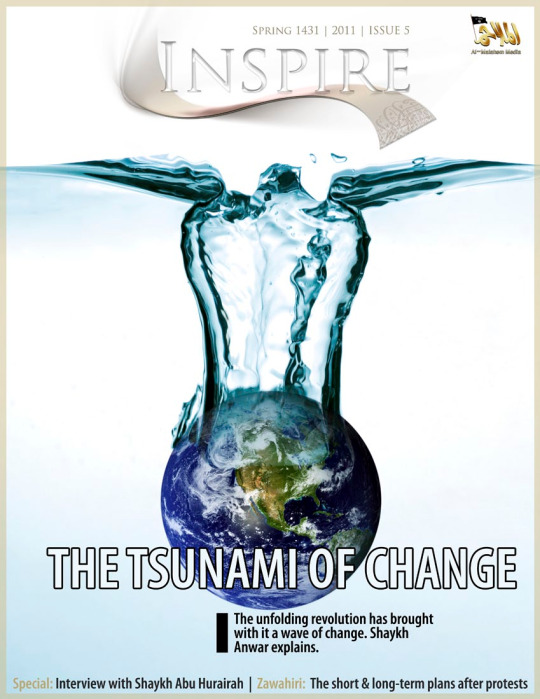
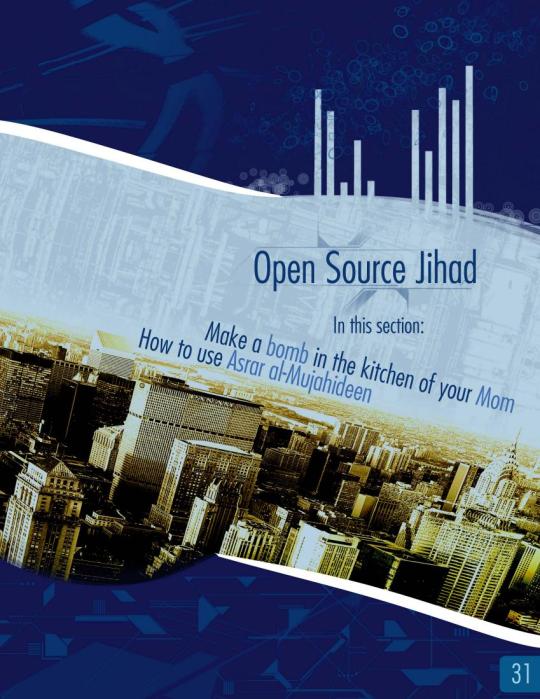

The insurgence of the 'Jihadi John Slideshow Trend'
During the period of 2014, youtube videos uploaded by the Islamic State of Iraq and Syria (ISIS) started surfacing on the internet. This was characterized by a series of masked militants criticizing the American or British government and then tying in the statements by the gruesome beheadings of hostages, ransoms, and soldiers.

Terrorists had often used their media presence as a driving force to influence the youth into affiliating themselves with terrorist ties. One of these was Jihadi John, unveiled as British militant and Kuwaiti-born Mohamed Emwazi. In these videos, Emwazi is often seen looming over the camera holding a knife and standing next to a kneeled hostage. He ends every video by beheading his victims. One of his most famous videos was the beheading of American Journalist James Foley.
Around June 2010, Emwazi was detained and in the middle of 2020, the insurgence of the “Jihadi John Slideshow” trend had reached tiktok. While the origins of this trend still remains obscure, this has left a lasting impact on the youth. Often, the demographic consisted of teens, specifically young males, who romanticized and glorified the acts of violence portrayed by Emwazi and the aesthetic of militaristic weaponry. Many had credited this behavior to “edgy” standards and humor, however, this idealism was proven to be more unironic than it seemed. Eventually, in the proceeding years, the trend had died out, however, it had came back a few times during period intervals of 2022 to 2023.
This trend had also harmfully villainized harmless ideologies, distorting these ideas to the point where it is repulsing for the public’s perception. An example of this is the concept of Jihad, where it is essentially the Islamic philosophy of struggling to defend the religion and attaining peace within the community and outside of it. It promotes the unity and solidarity of individuals where militaristic action is only done as a last resort of intervention. Often, Jihadi groups such as al-Qaeda and ISIS have spread distorted and extremist versions of this ideology, creating a brand new concept of utilizing violent militaristic resistance to protect Islam. With this dangerous approach, muslim communities are stigmatized, discriminated against, and stereotyped. This is especially harmful because it is a large problem that affects the community in various ways, especially when terrorists rebrand concepts initially striving to attain peace as acts of hatred and war, tainting a beautiful religion with images of violence.
Conclusion
Circling back to Prof. Najem’s analysis, without the media’s attention and focus, terrorists are unable to achieve any of the following four objectives: (1) recognition of the group name or ideology, (2) ability to communicate with supporters, (3) communicate with members of the local government, (4) and depict itself as a legitimate political alternative to the current governments. To conclude this essay, the relationship between mass media and terrorism is a complex and interdependent one, where the intricacies of both entities should be carefully observed and analyzed to unravel the deeper connections between the two.
While some researchers argue that media coverage is essential for the success of terrorist attacks, this view is sometimes overly simplistic and does not fully capture the intricate relationship between media portrayal and public reaction. Additionally, not all terrorist groups prioritize publicity over their other objectives. The symbiotic relationship between the media and terrorism is further complicated by the role of the state, which must balance transparency with security.
Several case studies, including the Oklahoma City Bombing, the Boston Marathon Bombing, and the rise of figures like Jihadi John, highlight the ways in which media coverage can both shape and be shaped by terrorist actions. These examples demonstrate how terrorist groups leverage media to spread their message and recruit new members, while the media, in turn, benefits from the increased attention and revenue generated by such coverage.
Ultimately, this relationship underscores the powerful role that the media plays in both perpetuating and combating terrorism. The challenge lies in finding a balance between reporting news and preventing the unintentional promotion of extremist ideologies.
#understandnotcondone#oklahoma city 1995#timothy mcveigh#world trade center 2001#boston marathon 2013#jahar tsarnaev#tamerlan tsarnaev#jihadi john#mohamed emwazi#trrsm
89 notes
·
View notes
Text
"Spanning nearly two centuries of global history, the basic pattern of trans misogyny is much older than TERFs, or right-wing Christians, and extremely consistent. Trans misogyny is not a mere psychological and irrational hatred of trans women. In fact, trans misogyny as a concept helps explain how individuals, or interpersonal violence, can act on behalf of the state or other abstract political movements. At the interpersonal level, however, trans misogyny testifies to the uncomfortable thickness of social bonds across hierarchies of gender, class, and race. When a straight man lashes out after dating or having sex with a trans woman, he is often afraid of the implication that his sexuality is joined to hers. When a gay man anxiously keeps trans women out of his activism or social circles, he is often fearful of their common stigma as feminine. And when a non-trans feminist claims she is erased by trans women's access to a bathroom, she is often afraid that their shared vulnerability as feminized people will be magnified intolerably by trans women's presence. In each case trans misogyny displays a fear of interdependence and a refusal of solidarity. Trans femininity is too sociable, too connected to everyone - too exuberant about stigmatized femininity - and many people fear the excess of trans femininity and sexuality getting too close. But sociability can never be confined or blamed on one person in a relationship; it's interpersonal, and it sticks to everyone.
The defensive fear and projection built into trans misogyny, whether genuine or performed, is an attempt to wish away what it nonetheless recognizes: that trans femininity is an integral part of the social fabric. There will be no emancipation for anyone until we embrace trans femininity's centrality and value."
177 notes
·
View notes
Text
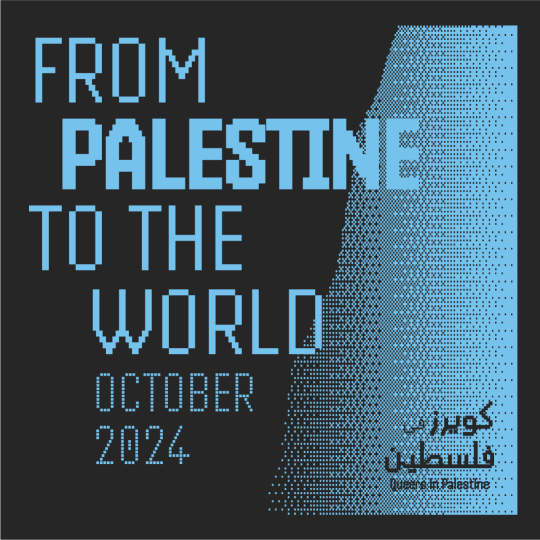
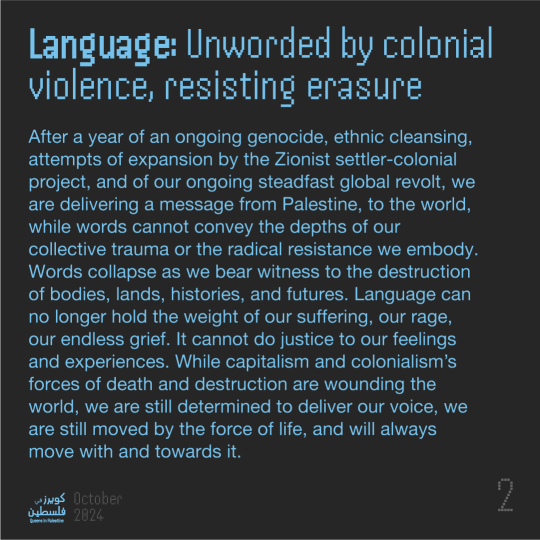

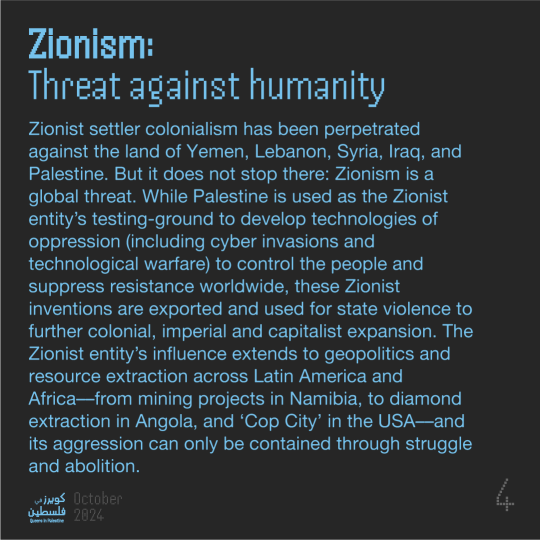



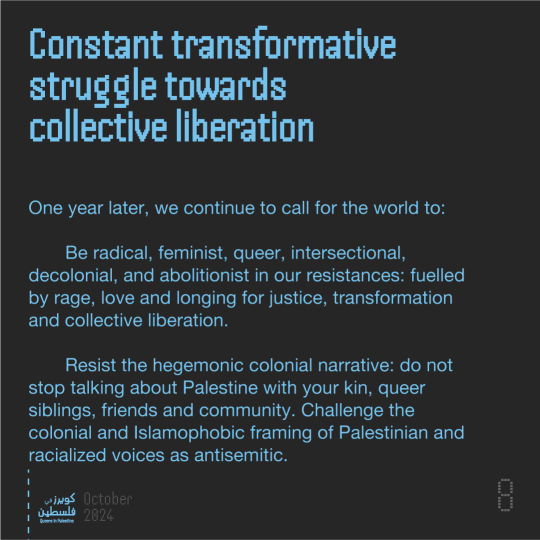
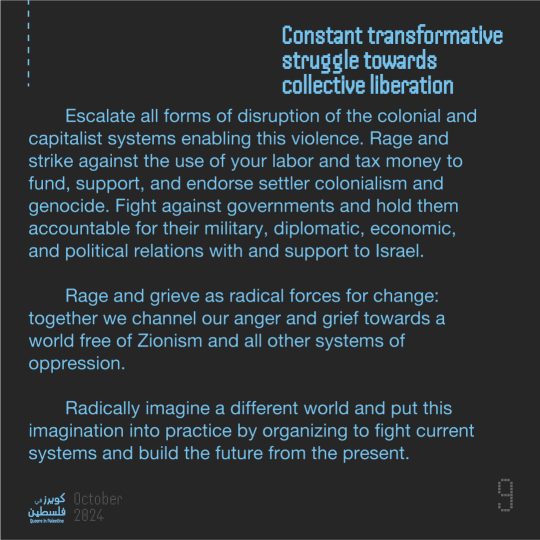

From Palestine To The World, October 2024 by Queers In Palestine.
Language: Unworded by colonial violence, resisting erasure
After a year of an ongoing genocide, ethnic cleansing, attempts of expansion by the Zionist settler-colonial project, and of our ongoing steadfast global revolt, we are delivering a message from Palestine, to the world, while words cannot convey the depths of our collective trauma or the radical resistance we embody. Words collapse as we bear witness to the destruction of bodies, lands, histories, and futures. Language can no longer hold the weight of our suffering, our rage, our endless grief. It cannot do justice to our feelings and experiences. While capitalism and colonialism’s forces of death and destruction are wounding the world, we are still determined to deliver our voice, we are still moved by the force of life, and will always move with and towards it.
Palestine and Lebanon: One land in grief and struggle
The Zionist colonial entity still exists because colonial and imperialist powers are supporting and funding it. These are the same powers that produced the Sykes-Picot colonial agreement that fragmented Palestine, Lebanon, Syria and Jordan and other Arab nations in 1916 by enforcing borders on our lands. We live with the implications of these systems. We deeply embody the knowledge of this violence, and have been trying to warn the world that these powers neither see our humanity nor respect our sovereignty. The world’s promises of justice and accountability through colonial international laws and institutions only reproduce violence and harm with no transformation. The very existence of these colonial powers is built on the (social) death and exploitation of others. The same tactics of annihilation that have been used in Gaza since last October are now also used in Lebanon. They are reaching us all––from surveillance tools of political repression, to weapons for direct killings. From corporations to other colonial structures, if we do not dismantle these systems, they will continue to consume us all.
Zionism: Threat against humanity
Zionist settler colonialism has been perpetrated against the land of Yemen, Lebanon, Syria, Iraq, and Palestine. But it does not stop there: Zionism is a global threat. While Palestine is used as the Zionist entity’s testing-ground to develop technologies of oppression (including cyber invasions and technological warfare) to control the people and suppress resistance worldwide, these Zionist inventions are exported and used for state violence to further colonial, imperial and capitalist expansion. The Zionist entity’s influence extends to geopolitics and resource extraction across Latin America and Africa––from mining projects in Namibia, to diamond extraction in Angola, and ‘Cop City’ in the USA–– and its aggression can only be contained through struggle and abolition.
The myth of individualism and separation
Individualism is an instrument of the systems of (neo)liberalism, racial capitalism and colonialism. It is designed to destroy our collectives and community practices through fragmentation and separation––from each other, the land, the planet and universe, and from ourselves. The illusion of separation denies our autonomy, our sovereignty over our bodies and land. We resist this colonial myth of individualism that serves oppressive systems. We are interdependent and our struggles are interconnected and intersectional––there is no such thing as individual liberation. No one is free, until we are all free.
On the path of abolition and transformation
Our reality, and our queer, feminist, radical truths, cannot be quantified. They cannot be reduced to data, to screens, to consumable images. The genocidal violence we face and resist everyday, is not an event to be documented. This deep rupture is a tearing apart of the fabric of life that demands something more than mere speech. It demands action and transformation. And it necessitates abolition. Abolition not just through the dismantling of prisons and the destruction of all carceral systems—but the refusal of all structures that seek to imprison and kill our bodies, our desires, our lands, our futures. Abolition is a direct confrontation with the forces that seek to erase us on the path towards life-affirming and systemic transformation, it is to radically imagine and build a different future from the present.
Hope as a radical practice
Our bodies ache with exhaustion, our spirits bruised by the relentless weight of oppression. In this land stolen from us, where we live the genocide in our every moment, hope is a radical practice. We are warriors, survivors, rebels. We will not be extinguished. The world’s indifference is a betrayal––we know that. We will not allow our disappointment to consume us. Fuelled by our collective rage and grief, we unite and empower us. Still amidst these difficult times, we channel our hope as a collective force of resistance to the very foundation of these unjust systems, in Palestine and everywhere. We will not only survive this genocide, we will thrive––reclaiming our stolen land and building a future free from the chains of patriarchy, colonialism, capitalism and zionism.
Constant transformative struggle towards collective liberation
One year later, we continue to call for the world to:
Be radical, feminist, queer, intersectional, decolonial, and abolitionist in our resistances: fuelled by rage, love and longing for justice, transformation and collective liberation.
Resist the hegemonic colonial narrative: do not stop talking about Palestine with your kin, queer siblings, friends and community. Challenge the colonial and Islamophobic framing of Palestinian and racialized voices as antisemitic.
Escalate all forms of disruption of the colonial and capitalist systems enabling this violence. Rage and strike against the use of your labor and tax money to fund, support, and endorse settler colonialism and genocide. Fight against governments and hold them accountable for their military, diplomatic, economic, and political relations with and support to Israel.
Rage and grieve as radical forces for change: together we channel our anger and grief towards a world free of Zionism and all other systems of oppression.
Radically imagine a different world and put this imagination into practice by organizing to fight current systems and build the future from the present.
Always re-membering: honoring those we have lost, and standing steadfast in resistance by all means possible.
61 notes
·
View notes
Text
“The great nations of Europe do not destroy the trade of the small nations for their own benefit, because they cannot; and the Dutch citizen, whose Government possesses no military power, is just as well off as the German citizen, whose government possesses an army of two million men, and a great deal better off than the Russian, whose Government possesses an army of something like four million. … All of which carries with it the paradox that the more a nation’s wealth is militarily protected the less secure does it become.”
That is a key passage from The Great Illusion by Norman Angell (1872-1967), first published in 1909. Today, this book, which became very influential just before the outbreak of the Second World War, could serve as a mirror for all those saying that European rearmament is useless because Russian President Vladimir Putin cannot afford or will not be strong enough to attack a European country anyway.
This so-called rational argument is made not only by some far-right and far-left parties in Europe—such as Germany’s Alternative for Germany or Left Party, or the Netherlands’ left-wing Party for the Animals, whose senators oppose increased defense spending because “there is no proof” of Russia’s intentions to attack a NATO country. It is also made by the exiled Russian economist Vladislav Inozemtsev, who recently wrote that Russia “possesses enough resources to continue its war against Ukraine and try to exhaust it further, but it definitely cannot afford another large war against an additional adversary.”
Especially in Europe, which would become the theater of war in case of a Russian attack, The Great Illusion deserves to be read widely. Angell, a renowned British economist, journalist, and peace activist, lived in an age not unlike ours today—an age of globalization and rapid technological innovation.
Feverish economic activity and booming economies led Angell to conclude that the economic price of war had become too high for European countries. None of them, he thought, would be foolish enough to sacrifice their wealth for war. This, in turn, led him to believe that war between large European powers had become economically irrational because it yielded nothing.
“The citizens of Switzerland, Belgium, or Holland,” he wrote, “countries without ‘control,’ or navy, or bases, or ‘weight in the councils of Europe,’ or the ‘prestige of a great Power,’ are just as well off as Germans, and a great deal better off than Austrians or Russians.”
With that, the rationale for a large nation to conquer a small one—namely, to acquire greater wealth—had practically vanished. If war still happened to break out, Angell argued, it would be likely to soon stop anyway because all participants would realize how foolish it was. Economic interdependence was, in his view, the ultimate guarantor of lasting peace on the continent.
The Great Illusion hit bookstores at a time when European empires (some of them superpowers, dominating the world) were rapidly arming themselves. Just like today, war was in the air while at the same time seeming rationally impossible. Angell’s book struck a chord with readers uncomfortable with this paradox, reassuring them all would be fine. Translated into several languages and reprinted many times, The Great Illusion became a cult book.
A few years later, in 1914, World War I broke out. It was a new kind of war, a war of the trenches that lasted long and killed millions of people while decimating European economies. And while wars in the past had mostly involved soldiers, sparing the civilian population, this war harmed civilians more than ever before.
What makes the book interesting is that today, some skeptics of European rearmament use the same argument that Angell made more than a hundred years ago.
Acknowledging the fact that European defense budgets have been slashed for decades since the end of the Cold War—with the so-called peace dividend allowing governments to redirect the money to social welfare, for example—today’s skeptics argue that there is no need to defend Europe against Russian aggression because there will be no aggression.
While it is true that Putin has repeatedly demanded NATO to retreat from the Baltic countries and the others that have joined the alliance after 1997, they say, they argue that he is just bluffing: Since a Russian attack against a Baltic country would trigger a wider war against NATO, this could not possibly be in Putin’s interest. Russia’s economy is suffering from international sanctions. It can hardly sustain the war effort against Ukraine, let alone one against NATO.
Just before Russia’s full-scale invasion in Ukraine began in February 2022, the same line of argument prevailed. U.S. intelligence showed that Russia had moved almost 190,000 troops to its border with Ukraine. Still, very few believed an attack was imminent, with some arguing that it would “not fit into Moscow’s cost-benefit calculus.” Today, U.S. President Donald Trump’s Middle East and Russia envoy, Steve Witkoff, echoes similar views.
Putin often repeats that he will defend ethnic Russians no matter where they live, as he did in Georgia and Ukraine. Still, many think that the chances of Putin using this pretext to invade a European country are slim. After three years of war, Russia’s territorial conquest is minimal. As an international pariah, Russia has trouble sustaining its economy—Russia’s GDP is about the same as Spain’s. Would that not be Europe’s best deterrence?
Angell’s reasoning that war destroys precious wealth plays out in another way, too. Fearful of Russia and spurred on by the Trump administration’s demands on NATO members to spend up to 5 percent of GDP on defense, European governments are facing the classic choice: butter or guns?
Fresh money for defense has to come from somewhere. Many Europeans fear that social benefits will be slashed. In order to prevent this, French columnist Pierre-Cyrille Hautcoeur recently wrote in Le Monde, Europe’s response to Russia’s threat should not be rearmament “but the promotion of its social-democratic market model, defense of the multi-polar world and unconditional support for international law as an alternative solution to conflicts.”
This is a pure echo of Angell’s rational, economic arguments against his more fatalistic contemporaries, terrified of the “inevitable” war against Germany.
If there is one lesson to be learned from Putin’s wars in Chechnya, Georgia, Ukraine, and also Syria and North Africa, it is that economic rationale does not weigh heavily on his choice to use force. The decision to go to war to restore an old empire is irrational by definition.
If there is any consistency in Putin’s reasoning, it is that economic arguments hardly come into the equation. Unfortunately, many Europeans seem to have forgotten not just the experience of war itself, but also the insight in the reasons why nations go to war. Each time in the past 25 years that Putin threatened to invade a country, many reacted by saying that he will probably not do it. Each time, when Putin then did invade, they fell off their chairs in almost all European chancelleries because they didn’t expect it.
Two world wars eventually persuaded Norman Angell to admit that his theory—for which he received the Nobel Peace Prize in 1933—was flawed. In the early 1930s, he acknowledged that while it is crucial to uphold democratic values and norms, countries need to be able to defend themselves against foreign aggression, and that those who decide not to defend themselves are actually inviting war by turning themselves into easy prey. As the Romans said, si vis pacem para bellum—if you want peace, prepare for war.
In 1914, Angell campaigned hard to keep Britain out of the war. By 1940, he wanted it to join the war as soon as possible. Less than a decade later, he became a staunch supporter of NATO.
His book is still in print. For good reasons: It is packed with wise lessons for today’s world.
26 notes
·
View notes
Text
“Let us begin by acknowledging that change is needed. Here I would clarify, lest there be any misunderstanding, that I am speaking about problems common to all Latin Americans and, more generally, to humanity as a whole. They are global problems which today no state can resolve on its own. With this clarification, I now propose that we ask the following questions:
Do we realize that something is wrong in a world where there are so many farmworkers without land, so many families without a home, so many laborers without rights, so many persons whose dignity is not respected? Do we realize that something is wrong where so many senseless wars are being fought and acts of fratricidal violence are taking place on our very doorstep?
Do we realize something is wrong when the soil, water, air and living creatures of our world are under constant threat?
So, let’s not be afraid to say it: we need change; we want change.
In your letters and in our meetings, you have mentioned the many forms of exclusion and injustice which you experience in the workplace, in neighborhoods, and throughout the land. They are many and diverse, just as many and diverse are the ways in which you confront them. Yet there is an invisible thread joining every one of those forms of exclusion: can we recognize it? These are not isolated issues. I wonder whether we can see that these destructive realities are part of a system which has become global. Do we realize that the system has imposed the mentality of profit at any price, with no concern for social exclusion or the destruction of nature?
If such is the case, I would insist, let us not be afraid to say it. we want change, real change, structural change. This system is by now intolerable: farmworkers find it intolerable, laborers find it intolerable, communities find it intolerable, peoples find it intolerable. The earth itself – our sister, Mother Earth, as Saint Francis would say – also finds it intolerable.
We want change in our lives, in our neighborhoods, in our everyday reality. We want a change which can affect the entire world, since global interdependence calls for global answers to local problems. The globalization of hope, a hope which springs up from peoples and takes root among the poor, must replace the globalization of exclusion and indifference!
Today, I wish to reflect with you on the change we want and need. You know that recently I wrote about the problems of climate change. But now I would like to speak of change in another sense. Positive change, a change which is good for us, a change – we can say – which is redemptive. Because we need it. I know that you are looking for change, and not just you alone: in my different meetings, in my different travels, I have sensed an expectation, a longing, a yearning for change, in people throughout the world. Even within that ever smaller minority which believes that the present system is beneficial, there is a widespread sense of dissatisfaction and even despondency. Many people are hoping for a change capable of releasing them from the bondage of individualism and the despondency it spawns.
Time, my brothers and sisters, seems to be running out; we are not yet tearing one another apart, but we are tearing apart our common home. Today, the scientific community realizes what the poor have long told us: harm, perhaps irreversible harm, is being done to the ecosystem. The earth, entire peoples, and individual persons are being brutally punished. And behind all this pain, death, and destruction there is a stench of what Basil of Caesarea called “the dung of the devil.” An unfettered pursuit of money rules. The service of the common good is left behind. Once capital becomes an idol and guides people decisions, once greed for money presides over the entire ecosystem, it ruins society, it condemns and enslaves men and women, it destroys human fraternity, it sets people against one another and, as we clearly see, it even puts at risk our common home.
I do not need to go on describing the evil effects of this subtle dictatorship: you are well aware of them. Nor is it enough to point to the structural causes of today’s social and environmental crisis. We are suffering from an excess of diagnosis, which at times leads us to multiply words and to revel in pessimism and negativity. Looking at the daily news we think that there is nothing to be done, except to take care of ourselves and the little circle of our family and friends. What can I do, as collector of paper, old clothes, or used metal, a recycler, about all these problems if I barely make enough money to put food on the table?
What can I do as a craftsman, a street vendor, a trucker, a downtrodden worker, if I don’t even enjoy workers’ rights? What can I do, a farmwife, a native woman, a fisher who can hardly fight the domination of the big corporations? What can I do from my little home, my shanty, my hamlet, my settlement, when I daily meet with discrimination and marginalization? What can be done by those students, those young people, those activists, those missionaries who come to my neighborhood with their hearts full of hopes and dreams, but without any real solution for my problems?
A lot! They can do a lot. You, the lowly, the exploited, the poor and underprivileged, can do, and are doing, a lot! I would even say that the future of humanity is in great measure in your own hands, through your ability to organize and carry out creative alternatives, through your daily efforts to ensure the three L’s (Labor, Lodging, Land) and through your proactive participation in the great successes of change on the national, regional and global levels. Don’t lose heart!”
— Pope Francis, address to the World Meeting of Popular Movements, Santa Cruz de la Sierra, Bolivia, July 9, 2015.
#Pope Francis#Popes#Papacy#Death of Pope Francis#Funeral of Pope Francis#Quotes by Pope Francis#Pope Francis Quotes#Pope Francis Speeches#Speeches of Pope Francis#Francis#Franciscus#Papa Francesco#Papa Francisco#Jorge Bergoglio#Jorge Mario Bergoglio#Papal Speeches#Papal History#Papal Quotes#Change#Poverty#Latin America#South America#Economic Refugees#Environment#Climate Change#Papal Addresses#Papal Trips#World Meeting of Popular Movements#Globalization#Faith
20 notes
·
View notes
Text
The global expressions of suffering—violence, the oppression of nondominant populations, the unsustainable and addictive consuming that threatens this earth—all arise out of fear and are rooted in feelings of separation and otherness. Radical compassion expresses the truth of our interdependence and mutual belonging. Living true to ourselves becomes, in its fullness, living true to our collective path of healing and freedom, our shared yearning for a peaceful, loving world.
— Tara Brach, Radical Compassion
46 notes
·
View notes
Text

The Conservation Movement—also known as nature conservation or environmental conservation—is a broad, historical, and multifaceted movement aimed at preserving, protecting, managing, and restoring the natural environment, biodiversity, and Earth's resources. Rooted in both scientific understanding and ethical considerations, the conservation movement spans over two centuries and involves a dynamic interplay of politics, ecology, economics, law, and culture. It emerged in response to industrialization, habitat destruction, overexploitation of natural resources, and the extinction of species. Today, it is a global effort integrating local, national, and international initiatives with a growing emphasis on sustainability, ecosystem resilience, and justice.

The conservation movement began in the 18th and 19th centuries, particularly in Europe and North America, as a response to rapid industrialization, deforestation, and the decline of wildlife populations. The Enlightenment and the subsequent Romantic movement cultivated an appreciation for nature, prompting early naturalists, artists, and scientists to advocate for the intrinsic value of wilderness.
In the United States, the roots of the movement can be traced to the transcendentalist thinkers such as Henry David Thoreau and Ralph Waldo Emerson, who emphasized the spiritual and moral value of nature. Thoreau’s Walden (1854) is widely considered a foundational text for American environmental thought. The 19th century also saw the rise of the “wise-use” philosophy, articulated by figures like Gifford Pinchot, the first chief of the U.S. Forest Service, who argued for the scientific management and sustainable use of natural resources.
Simultaneously, a more preservationist perspective emerged, most famously represented by John Muir, the founder of the Sierra Club. Muir argued for the protection of wilderness areas for their aesthetic, spiritual, and ecological values, independent of human use. His activism was instrumental in the establishment of Yosemite National Park and the broader U.S. National Parks system.
In Europe, similar impulses took form. In the United Kingdom, the romanticized vision of rural landscapes and concern over the degradation of common lands led to early conservation societies, such as the National Trust (founded in 1895). Germany also fostered a robust conservation ethic, influenced by scientific forestry and the Heimat (homeland) movement, which emphasized regional identity and nature protection.

The development of ecology as a scientific discipline in the late 19th and early 20th centuries provided a critical foundation for the conservation movement. Pioneers like Ernst Haeckel (who coined the term "ecology"), Frederic Clements, Charles Elton, and Aldo Leopold advanced understanding of ecosystems, species interdependence, and ecological succession.
Aldo Leopold’s A Sand County Almanac (1949) marked a turning point by introducing the “land ethic,” a philosophy that called for a responsible relationship between people and the land they inhabit. Leopold argued that humans are part of a larger ecological community and must act as stewards rather than conquerors. This ecological view significantly influenced later environmental ethics and conservation biology.
The rise of conservation biology in the 1980s further integrated scientific research with conservation practice. Conservation biology is a mission-oriented discipline that focuses on understanding and mitigating biodiversity loss, managing endangered species, and designing protected areas. Key concepts include population viability analysis, habitat fragmentation, genetic diversity, metapopulations, and ecological restoration.

The institutionalization of conservation was facilitated by the creation of national parks, wildlife refuges, and environmental regulatory bodies. In the U.S., the establishment of Yellowstone National Park in 1872 as the world’s first national park signaled a new era in public conservation. The U.S. Forest Service (1905), National Park Service (1916), and numerous state-level conservation agencies laid the groundwork for resource and landscape protection.
Globally, conservation gained momentum with the founding of organizations such as the International Union for Conservation of Nature (IUCN, 1948), World Wildlife Fund (WWF, 1961), and United Nations Environment Programme (UNEP, 1972). These institutions helped develop international frameworks, promote conservation funding, and coordinate transboundary conservation efforts.
Legal frameworks also evolved, including landmark legislation such as the U.S. Endangered Species Act (1973), the Clean Water Act (1972), and the National Environmental Policy Act (1970). International treaties, including the Convention on International Trade in Endangered Species (CITES, 1973), the Ramsar Convention on Wetlands (1971), and the Convention on Biological Diversity (1992), created binding mechanisms to protect ecosystems and regulate resource use.

Post-World War II decolonization and the rise of global environmentalism brought attention to conservation challenges in the Global South. Many of the world's biodiversity hotspots—such as the Amazon rainforest, Congo Basin, Southeast Asian archipelagos, and coral reef systems—are located in developing countries where conservation often intersects with economic development, indigenous rights, and poverty alleviation.
In some instances, conservation policies imposed by international NGOs or governments led to the displacement of local communities, creating what critics term “fortress conservation.” This has led to growing advocacy for community-based conservation approaches, which integrate local ecological knowledge, respect indigenous sovereignty, and aim for equitable benefit sharing. Examples include the CAMPFIRE program in Zimbabwe, participatory forest management in India, and locally managed marine areas in the South Pacific.
The intersection of conservation with development goals became more prominent through initiatives such as sustainable development, biosphere reserves, and the United Nations Sustainable Development Goals (SDGs), particularly Goal 15 (Life on Land) and Goal 14 (Life Below Water).

Conservation employs a wide array of strategies to preserve species, habitats, and ecosystem functions. These include:
Protected Areas: The cornerstone of global conservation efforts, protected areas range from strict nature reserves to multi-use biosphere reserves. The IUCN categorizes these areas into six types, depending on the level of human activity allowed.
Species Conservation: Efforts include captive breeding, reintroduction programs, habitat protection, anti-poaching measures, and conservation genomics. Flagship species (e.g., tigers, pandas, elephants) are often used to garner public support.
Habitat Restoration: Restoration ecology seeks to rehabilitate degraded ecosystems. This involves removing invasive species, reforesting, reintroducing native flora and fauna, and restoring hydrological cycles.
Landscape and Ecosystem-Based Conservation: Strategies such as ecological corridors, integrated land-use planning, and conservation mosaics aim to preserve ecological integrity at broader scales.
Ex Situ Conservation: Botanical gardens, seed banks, zoos, and cryopreservation facilities act as repositories for genetic material and living specimens.
Marine Conservation: Marine protected areas (MPAs), sustainable fisheries management, coral reef restoration, and efforts to reduce ocean pollution are key components of marine conservation.

Despite extensive efforts, conservation faces numerous and intensifying threats. Chief among these are:
Habitat Loss and Fragmentation: Driven by agriculture, urbanization, logging, and infrastructure development, habitat destruction is the primary driver of biodiversity loss.
Climate Change: Alters species ranges, disrupts phenology, exacerbates extreme weather, causes coral bleaching, and threatens entire ecosystems.
Pollution: Includes nutrient runoff (eutrophication), heavy metals, plastic waste, and air pollutants, affecting both terrestrial and aquatic systems.
Invasive Species: Non-native species can outcompete, prey upon, or bring diseases to native flora and fauna.
Overexploitation: Unsustainable hunting, fishing, logging, and trade in wildlife products continue to drive population declines.
Sociopolitical Conflict: War, corruption, weak governance, and lack of enforcement undermine conservation efforts.

Conservation is not solely a scientific endeavor—it is also deeply philosophical and ethical. Key debates include:
Anthropocentrism vs. Ecocentrism: Whether nature should be protected for its utility to humans or for its own intrinsic worth.
Deep Ecology: A philosophical movement that promotes the inherent value of all living beings, regardless of their utility.
Environmental Justice: Focuses on the fair distribution of environmental benefits and burdens, particularly for marginalized communities.
Ecofeminism: Examines the links between the oppression of nature and the oppression of women.
Traditional Ecological Knowledge (TEK): Recognizes the value of indigenous and local knowledge systems in managing and understanding ecosystems sustainably.

Modern conservation is increasingly interdisciplinary, incorporating technologies such as remote sensing, GIS mapping, environmental DNA (eDNA), drones, AI for poaching surveillance, and bioacoustics. Citizen science, open data, and participatory monitoring are also expanding public involvement.
“Rewilding” has emerged as a radical conservation strategy, involving the restoration of self-regulating ecosystems and the reintroduction of keystone species (e.g., wolves in Yellowstone). Debates continue over the ecological, ethical, and political implications of such approaches.
The concept of “Planetary Boundaries” and “Half-Earth” (proposed by E.O. Wilson) have gained traction in scientific and policy circles, promoting limits to human encroachment and the protection of vast areas for biodiversity.
Conservation finance is another growth area, including mechanisms like biodiversity offsets, green bonds, carbon markets, and payments for ecosystem services (PES). These aim to align economic incentives with conservation goals, though they remain controversial in practice.

The conservation movement is one of the most significant and enduring human responses to the ecological crises of the modern world. It has evolved from elite wilderness preservation to a global, pluralistic movement that engages science, policy, philosophy, and communities. As biodiversity loss accelerates and the Anthropocene unfolds, the conservation movement continues to adapt, guided by a blend of ethical imperatives, scientific understanding, and social responsibility. The future of conservation will depend not only on scientific and technological advances, but on inclusive governance, cultural shifts, and a redefinition of humanity’s relationship with the natural world.
#conservation movement#environmental conservation#nature preservation#save the planet#ecology#biodiversity#sustainability#green future#wildlife protection#climate action#eco activism#environmental justice#natureis sacred#earth first#rewilding#protect nature#environmental ethics#conservation biology#eco philosophy#endangered species#planet earth#environmental history#sustainable living#nature photography#aesthetic nature#eco art#environmental awareness#land ethic#green politics#ecocentrism
18 notes
·
View notes